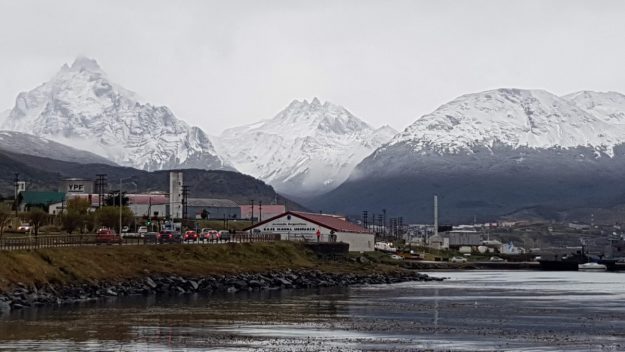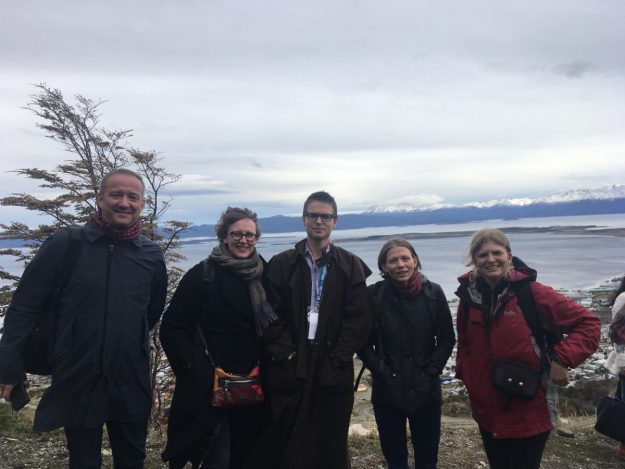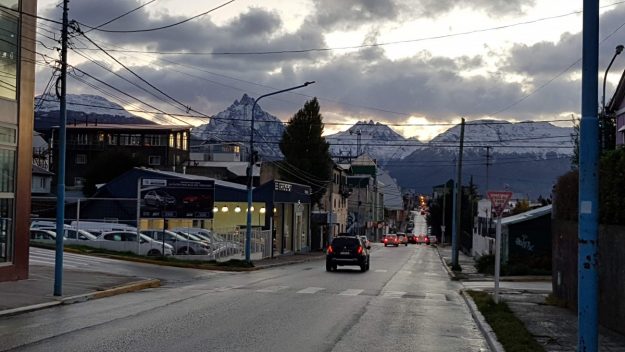Author: Lize-Marié van der Watt
About a decade ago, a handful of humanities and social science scholars joined an international conference to commemorate 50 years since the signing of the Antarctic Treaty. They were part of an Action Group (est. 2006) within the Scientific Committee on Antarctic Research (SCAR), delivering papers to a small audience in a windowless basement room in Washington DC. However, this year’s conference, “Antarctic Connections at the End of the World,”—handled by what became the Standing Committee on Humanities and Social Sciences (SC-HASS)—was attended by 130 participants from all seven continents and took place in a large hall with splendid views over the Beagle Channel, in Ushuaia, Argentina. It is clear that this community has not only reached a critical mass but also a critical maturity.

Certainly, this year was a watershed moment. Well-known scholars whose primary work does not usually consider Antarctica chose to attend the conference. There were lively debates between different schools of thought—for example, on cultural heritage in Antarctica, the resilience of the Antarctic Treaty System, and colonial and decolonial perspectives on Antarctic history and literature. The conference empathetically demonstrated that—in addition to their usefulness in multidisciplinary approaches to major research problems—the humanities and social science disciplines are crucial in and of themselves. It is also becoming apparent that scholars can use Antarctica to think through a lot of contemporary outstanding issues in the humanities and social sciences.
Researchers from the Division of History of Science, Technology, and Environment made a strong showing at the conference. Kati Lindström’s investigation of Chilean and Japanese perspectives on the Convention on the Regulation of Antarctic Mineral Resource Activities (CRAMRA) negotiations got a special mention in the SCAR newsletter for starting a conversation on the importance of working in different languages. She presented in a session on “Historical Antarctic Strategies” which highlighted how the dominant stories of significant moments, agents and actants in the governance and exploration of Antarctica are coloured by standpoints of those that tell them. Justiina Dahl, who until recently was a postdoc at the division but now works at the Swedish Polar Research Secretariat, presented in the same session, using an analysis of the justificatory narratives in the establishment of the Finnish Antarctic Programme. Peder Roberts argued in his presentation that the scale of logistics contracts and research infrastructures from the International Geophysical Year onwards constitute the hidden part of the historical iceberg when it comes to the history of Antarctic research.

A session organised by the Creating Cultural Heritage in Antarctica project (CHAQ) took critical heritage approaches to historic sites and monuments in an official but also unofficial sense. Lize-Marié van der Watt dug into the history of the procedure by which official heritage in Antarctica is created, asking to what extent it can be seen as part of a pursuit for knowing, and controlling, the Antarctic environment. In his presentation, Dag Avango proposed a theoretical framework for understanding the role of heritage making in international competitions for influence over the polar regions, by placing heritagization processes within the framework of a wider discussion on the relation between humans, things and ecologies in post-humanities scholarship. Kati also presented in this session, tracing the regionalisation of Antarctic Heritage in Chile and Japan.

Travelling to the end of the world (or Fin del Mundo as Ushuaia is commonly known), the KTH team used this opportunity to also conduct some fieldwork in the area and en route, including visiting polar-related museums such as the Corbeta Uruguay, the Museo Malvinas e Islas del Atlántico Sur, some military museums in Buenos Aires, and the Museo Marítimo y del Presidio de Ushuaia. Kati also conducted interviews with key actors in Argentine Antarctic environmental and cultural policy. Excitingly, some of us also met with authorities in Argentina to discuss plans for an Argentine-Swedish Antarctic expedition to some key historical sites on the Antarctic peninsula. More will be revealed soon.


No comments yet. Be the first to comment!